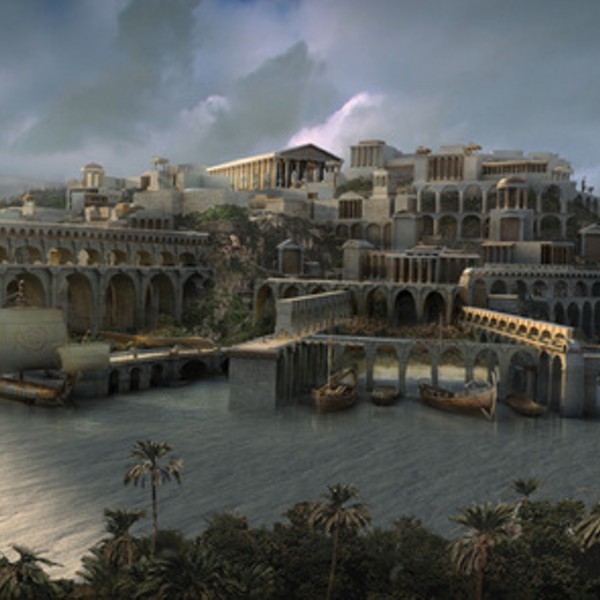The other night while I was exploring the astrology of the Large Hadron Collider—a particle smasher that scientists will use to study the formation of the universe—I joked that the lead scientist, Professor Peter Higgs, was a holdover from Atlantis. It went well with the story of a multibillion-dollar machine supposedly designed to have some kind of spiritual outcome and a chart that looked a little like a runaway train.
I am careful what I joke about; there’s this odd spell that follows me around, under which my jokes come true. Looking at his face peering out from beneath his dashing green hardhat, I started to recognize him. You know that odd feeling of having met someone before, but it wasn’t any time in the past few thousand years?
Higgs is the namesake of the “God particle,” which this $8 billion machine was designed to discover. Science is the fairly recent development in human consciousness that supposedly replaced religious dogma and superstition. In its latest major chapter, science has gone on a hunt for a subatomic particle that gives birth to all other basic subatomic particles, a kind of portal to another dimension. If anything, it’s the Goddess particle. Meanwhile, these scientists think that this device they’ve created 500 feet under the ground is so powerful that it could, under the right circumstances, create mini black holes.
I kept looking at Professor Higgs, who is described as humble and unassuming, and wondering who he really is. I wondered what he must feel like, having the God particle named after him. This is what put the feeling into the pit of my stomach: He’s back, in the form of a British physicist, one of the people I think of as the Engineers. One of my reincarnation theories is that people come back with similar jobs or roles, perhaps more or less harmless, sometimes trying to grow up get it right this time, and others undecided or firmly committed to making matters worse.
Atlantis and Reincarnation
You’ve probably never read anything in which I discuss reincarnation at length, or with a particular dogma; such thought is too often used as a weapon, and I think astrology holds a relatively small part of the key to understanding specific past lives. There are, however, a lot of people I see in the public sphere, sometimes on TV and sometimes in places such as a Senate committee, where I get the feeling that we’re meeting again.
Atlantis, a favorite reincarnation destination, is the stand-in for a nearly perfect, powerful civilization with real potential that lost its grip as a result of some tragic flaw. Introduced to Western thought by Plato, it may or may not be historically real; he seemed to mean it as a metaphor, though he gives some exact measurements of structures that were there. I think of it as half real, half metaphor for everything else.
There are plenty of real ones: Babylon, Troy, Pompeii, and others feed the mythology into our DNA. On some level we know that our own civilization may be on the short list of those about to fall, which may be why it is so easy for so many to care so little.
From among the mythical lost civilizations, we have made up lots of stories; and we may have inherited memories, traumas, and some technology. We are also presumed to inherit hubris, a flaw in our awareness wherein we think we’re big and bad and get ourselves into some big and bad trouble. Inherent in the Atlantis concept is a question: “Are we next?” There is more than a touch of catastrophobia around this theme.
There seem to be two sides to the Atlantis issue. One is spiritual, regarding our relationship to God or the cosmos. The other is technological, regarding our relationship to Big Science and ordinary technology. The two issues are, at times, closely bonded; for us, they both address the question of existence or, more often, the threat of nonexistence.
Either God will create the Rapture, or one of our Big Science machines will run out of control. If we worship technology and turn it into God, we’ll surely have problems. Or we may intentionally use technology as a means of either discovering God (the Large Hadron Collider) or thinking we are God (the nuclear bomb, which Americans and only Americans have used on civilians).
Atlantis, the Asteroid
When you take these themes and wrap them in the issue of whether any of this is going to be our downfall, that is the essence of Atlantis. It has an asteroid, number 1198, so the way you would write that is (1198) Atlantis. My keywords for this point are the use and abuse of technology, but this can be on any scale you like, and the results of that use are included. (1198) Atlantis also hints at our anxiety around the fall of our own civilization.
In the chart for the start-up for the Large Hadron Collider, Atlantis shows up in an interesting configuration: First of all, it’s in Scorpio, making it a deep influence encrypted in our DNA. It’s in the 2nd house, indicating a values system. It’s conjunct is an asteroid called (443) Photographica. I am sure the people who worked on this project would not be flattered to hear it called a glorified camera, but here we have an image of just that: It’s designed to take pictures of the conditions that it creates, including conditions at the beginning of the universe. If we’re looking for a God particle, then presumably we are looking for a picture of God. Atlantis/Photographica also conjuncts with one of the fates, Klotho, which minor planet astrologer Martha Wescott tells us is about the conditions at the beginning.
This setup is opposite Atropos (root of the word atrophy), which is about the conditions at the end; and Asbolus, the common struggle of survival shared by all living things, related to how all living things contain carbon. So we have a picture of the beginning and the end suggested in the same chart, clustering around this theme of Atlantis.
These are tightly square to the asteroid (128) Nemesis, which is in Aquarius. Nemesis in Greek mythology, says Wikipedia, “was the spirit of divine retribution against those who succumb to hubris, vengeful fate personified as a remorseless goddess. The name Nemesis is related to the Greek word meaning ‘to give what is due.’”
In Conversations with God by Neale Donald Walsh, there is a part that I think of as the Atlantis passage. “As I have said, this isn’t the first time your civilization has been at this brink,” God says. “Once before on your planet, the technology you developed was far greater than your ability to use it responsibly. You are approaching the same point in human history again. Your society is on the verge of becoming a product of your technology rather than your technology being a product of your society. When a society becomes a product of its own technology, it destroys itself.”
Atlantis and the Apocalypse
We live in times that many people with a long future are thinking of as the “end times,” and also in times that are actually apocalyptic for others. For example, this includes tribes whose homelands are being wiped out by the logging of the Amazon, or entire societies that were lost to the Asian tsunami in December 2004.
For those of us in Western civilization who have food to eat and warm beds to sleep in, the apocalypse functions as a psychological factor. It’s the projection of the fear of individual death onto the whole society. Those who can’t process or address their own fear of death are the ones most likely to have to project it onto everyone else.
To me this is why Rapture Christians are so scary: They cannot conceive of themselves dying; they fear hellfire and damnation; we all have to go at once. I guess it’s easier for them that way (it’s the same basic psychology as the murder-suicides we read about in shopping malls). When you mix this up with religion, politics and the atomic bomb, that is certifiably scary. Nobody who has the Apocalypse in their personal belief system should be allowed anywhere near the controls for the atomic bomb.
Sometimes things get so weird that we need to look to mythology for a reflection, as a means of understanding what we’re going through. J.R.R. Tolkien has a little-known book called Akallabeth, about the fictional fall of the kingdom of Numenor. It’s one of the books leading into The Lord of the Rings. We have all met Strider or Aragorn, who is a direct descendent of Numenorian refugees who fled the destruction of their continent. This is Tolkien’s story of Atlantis.
For Tolkien, the crisis was not technological; it involved religion and the fear of death that haunted the original Numenorians. Many of Tolkien’s deeper themes involve mortality. Strider, for example, is mortal, but when he becomes king, he marries Arwen, an immortal. The Numenorians, in their day, had exceptionally long lives, but did not live forever. They began to envy the gods and the elves, who could live forever if they wanted. They became so haunted by the fear of death and the obsession with living forever that they became conquerors.
In fact, they sailed to Middle Earth with a plan to take as hostage Sauron, the Dark Lord. He gave himself over willingly to be their prisoner and was taken back to their astonishing civilization—but with a secret plan to take advantage of the Numenorians’ fear and destroy them. Eventually, he convinces the king that he and his people are better than the gods and goddess, who live in a land to the east (where they are forbidden to sail). Finally, he convinces them to wage war on the gods. And this they do. The psychology is clear: The fear of their own death leads them to attempt to conquer the immortals. They try—but, in return, their island is destroyed without a trace, except for nine ships that sail back to Middle Earth.
We may think that our tragic flaw involves technology and its abuse, from our obsession with games and technical diversions to our casual attitude toward the nuclear bomb. But I think that beneath that is the spiritual issue that Tolkien lays out so vividly in Akallabeth. We don’t see it, but that lurking fear drives us to do nearly everything we do, and to avoid nearly everything we avoid. The fear of death haunts our technology, which is often used to act out murderous games. It haunts our relationships and our perception of politics and of the future. Many of our political leaders profess to believe in the Rapture.
The fear of death is indeed driving us closer to the brink of collective disaster: In our own minds, we are becoming the next Atlantis. What we may not know is that such a fate is optional. Yet that’s always how it is.
Additional research by Mari Kim and Genevieve Salerno.

















